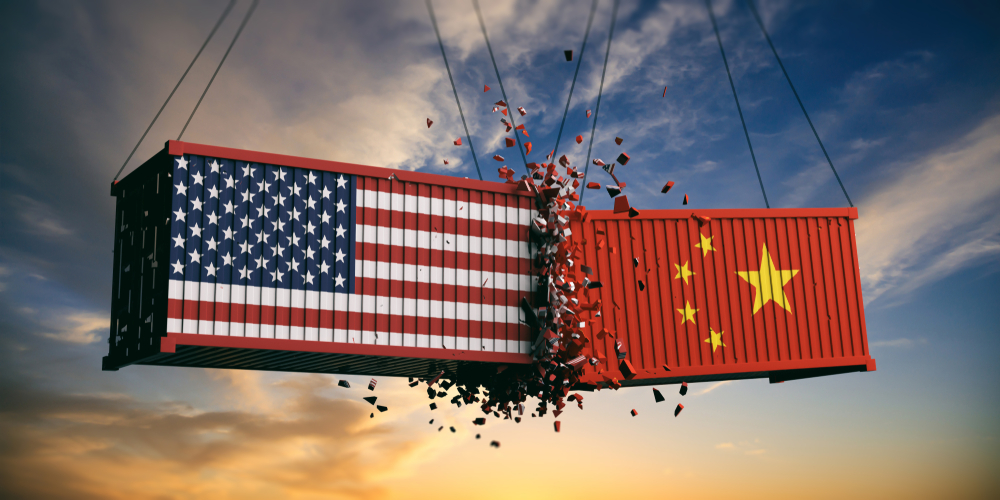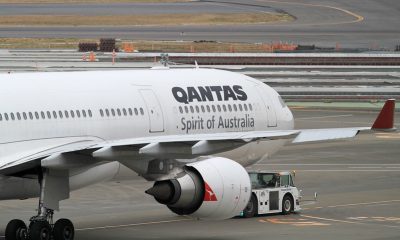News
China retaliates on tariffs, stock markets go into a slide

In doing so, American officials accused China of backtracking on commitments it made in earlier negotiations. (Shutterstock Photo)
BEIJING — Sending Wall Street into a slide, China announced higher tariffs Monday on $60 billion worth of American goods in retaliation for President Donald Trump’s latest penalties on Chinese products.
Duties of 5% to 25% will take effect on June 1 on about 5,200 American products, including batteries, spinach and coffee, China’s Finance Ministry said.
With investors worried about the potential economic damage on all sides from the escalating trade war, the Dow Jones Industrial Average fell 617 points, or 2.4%, and the technology-heavy Nasdaq plunged 270 points, or 3.4%, its biggest drop of the year. Earlier, stocks fell in Europe and Asia.
“We appear to be in a slow-motion train wreck, with both sides sticking to their positions,” said William Reinsch, a trade analyst at the Center for Strategic and International Studies and a former U.S. trade official. “As is often the case, however, the losers will not be the negotiators or presidents, but the people.”
Beijing’s move came after the U.S. raised duties Friday on $200 billion of Chinese imports to 25%, up from 10%. In doing so, American officials accused China of backtracking on commitments it made in earlier negotiations. The same day, trade talks between the two countries broke up without an agreement.
On Twitter, Trump warned Xi that China “will be hurt very badly” if it doesn’t agree to a trade deal. Trump tweeted that Beijing “had a great deal, almost completed, & you backed out!”
The rising trade hostilities could damage the economies of both countries. The tariff increases already in place have disrupted trade in such American products as soybeans and medical equipment and sent shockwaves through other Asian economies that supply Chinese factories.
Still, the two countries have given themselves something of an escape hatch: The higher Chinese tariffs don’t kick in for 2 1/2 weeks. The U.S. increases apply to Chinese goods shipped since Friday, and those shipments will take about three weeks to arrive at U.S. seaports and become subject to the higher charges.
Also, both countries have indicated more talks are likely. Top White House economic adviser Larry Kudlow said Sunday that China has invited U.S. Trade Representative Robert Lighthizer and Treasury Secretary Steven Mnuchin to Beijing. But nothing has been scheduled. And Trump said Monday that he expects to meet Chinese President Xi Jinping in late June at the G-20 summit in Osaka, Japan.
The president has repeatedly insisted that increased tariffs on Chinese goods don’t hurt American consumers. But Kudlow, head of the president’s National Economic Council, acknowledged over the weekend that U.S. consumers and businesses will bear some of the costs.
“Both sides will pay,” he told Fox News.
In the U.S., prices of soybeans, targeted by Chinese tariffs last year, fell Monday to a 10-year low on fears of a protracted trade war.
In a statement, American Soybean Association President Davie Stevens, a soybean farmer from Clinton, Kentucky, expressed frustration that “the U.S. has been at the table with China 11 times now and still has not closed the deal. What that means for soybean growers is that we’re losing. Losing a valuable market, losing stable pricing, losing an opportunity to support our families and our communities.”
Trump told reporters Monday that a new program to relieve U.S. farmers’ pain is “being devised right now” and predicted that they will be “very happy.” The administration last year handed farmers aid worth $11 billion to offset losses from trade conflicts.
Trump seemed to suggest that the aid will make up for or partially cover the $15 billion that he said represented “the biggest purchase that China has ever made with our farmers.” In fact, U.S. farm exports to China approached $26 billion in both 2012 and 2013 and came in at $19.5 billion in 2017 before his trade war began taking a toll on agricultural sales to China.
The president’s allies in Congress scrambled to limit the damage to farm country.
Republican Sen. Chuck Grassley of Iowa said it is time for U.S. allies to “get in the game” to push China to the negotiating table. “China needs to get with it,” he said. “You can’t move these goalposts like they’re moving them and expect to be respected.”
The highest tariffs announced by China will apply to industrial chemicals, electronic equipment, precision machinery and hundreds of food products.
Beijing is running out of U.S. imports to penalize because of the lopsided trade balance between the world’s two largest economies. Chinese regulators have instead targeted American companies in China by slowing down the clearing of shipments through customs and the processing of business licenses.
Oxford Economics calculated that the higher tariffs will reduce the U.S. economy by 0.3% in 2020, a loss of $490 per American household.
Similarly, forecasters have warned that the U.S. tariff increases could set back a Chinese recovery that had appeared to be gaining traction. Growth in the world’s second-largest economy during the January-through-March period held steady at 6.4% compared with a year earlier, supported by higher government spending and bank lending.
The tensions “raise fresh doubts about this recovery path,” Morgan Stanley economists said.
The latest U.S. duties could knock 0.5 percentage points off annual Chinese economic growth, and that could widen to 1 percentage point if both sides extend penalties to all of each other’s exports, economists say. That would pull annual growth below 6%, raising the risk of politically dangerous job losses.
China’s state media tried to reassure businesses and consumers that the ruling Communist Party has the means to respond.
“There is nothing to be afraid of,” said the party newspaper People’s Daily. “The U.S.-instigated trade war against China is just a hurdle in China’s development process. It is no big deal.”
Trump has threatened to extend tariffs to the remaining $300 billion or so in Chinese tariffs that haven’t been targeted yet, but told reporters Monday: “I have not made that decision yet.”
The president started raising tariffs last July over complaints China steals or pressures foreign companies to hand over technology and unfairly subsidizes Chinese businesses that are striving to become global leaders in robotics and other technology.
A stumbling block has been U.S. insistence on an enforcement mechanism with penalties to ensure Beijing carries out its commitments.
———
Wiseman reported from Washington.
Jill Colvin and Catherine Lucey in Washington contributed to this story.





















